….continued from “I don’t want a job, I want a career.”
“Warburtons, as far as I know, have always been interested in supporting the community that sustains them, so to speak. In Bolton, in particular. They’ve been heavily involved with Bolton Wanderers over the years and have done lots and lots of social enterprise-type projects. My understanding is they have pockets of funding they’re prepared to invest across their communities,” says Mick.
“The idea for our project is to support some Bolton at Home clients through this self-employment project. So we’re working with about 10 local people who might have been long-term unemployed or have some other barriers that stop them moving on.
“Warburtons are not looking for massive outcomes, and they’re not expecting all 10 people to suddenly become self-employed and self-sufficient. What they are looking for is the journey, for these individuals to make some progress.”
“They’re being realistic about what can reasonably be achieved,” I suggest.
“Very much so,” says Mick, “and Chris, at the moment, is a roaring success.”
“So, how does it work?” I ask Chris, “Are you still on benefits?”
“Yes,” he says, “but that’s because I work for less than 16 hours a week. A lot less. I have to declare each week to the JobCentre advisor how much I have worked in case it affects my money.”
“We’re trying to gradually move people like Chris into self-employment so they can eventually come off benefits,” explains Mick. “It’s Catch-22, the lad’s got the get up and go to find the work but doesn’t earn enough to support himself.
“We’re putting in place what I call the building blocks of legitimacy, so he’s got a firm footing from which to build his business. We’ve sorted him out with insurance, got a load of leaflets printed – they’re in the boot of my car, Chris, I’ll give them to you later – bought him tools, with the hope he can build a client base that will sustain him over the winter.”
“There’s always plenty to do in the winter,” says Chris.
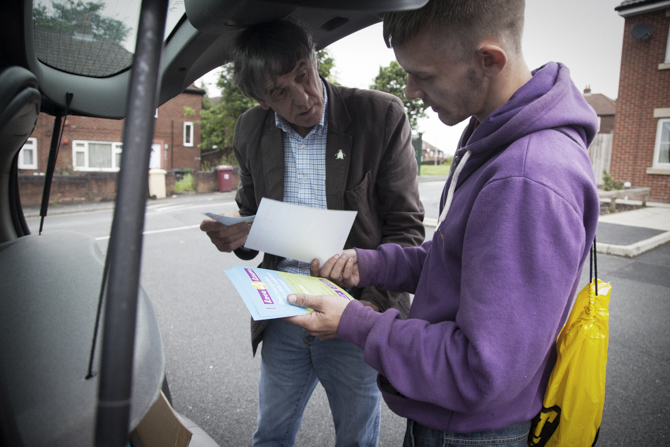
“And who, typically are your customers?” I ask.
“Households mainly,” he says, “and some businesses. Having insurance will be a big help with the businesses. Schools and churches won’t let you near the place unless you’ve got public liability insurance. But I mostly try the posh houses, with big gardens.”
“But where?” I ask, knowing there aren’t that many posh houses in Breightmet.
“Some round here,” says Chris, “but I will go further afield.”
“Tell him how you get your equipment around,” says Mick.
“I pull it along on a little box cart I’ve made because I don’t want to ruin the lawnmower, it’s only got plastic wheels. Sometimes I’ll go as far as Farnworth.”
I’m not familiar with the distances. “How far is that?” I ask.
“About four or five miles. It would take me about an hour and a half walking there and back.”
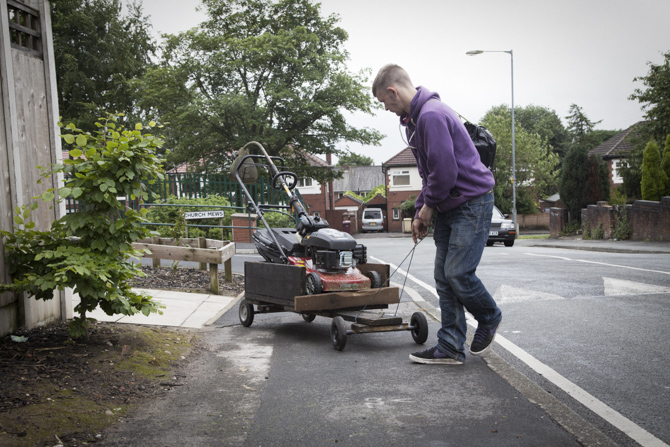
“And how much do you charge? What’s your hourly rate?”
“For my regular clients it’s £5 an hour, but generally it’s £7.50, but if I’m going that far, I’ll try and get a day’s work to make it worth my while.”
“Chris finds pricing difficult,” says Mick.
“That’s when I talk to these guys. They can help me out with all those gaps I’m missing. Sometimes I just ring them up and ask them random questions. It’s good to have someone to talk to, and if they don’t know the answers they’ll go out of their way to find them for me.”
“I haven’t told you this yet,” Mick says to Chris, “but I have a pal who lives near me and he’s a landscape gardener. He started off much the same way as you’re doing and now he has four or five people working for him. He’s doing all right. Anyway, he’s agreed to talk to you and give you some advice about the next steps.”
Chris smiles and nods his approval.
Got a garden within cart-dragging distance of Breightmet? Love 4 Lawns is on 07808 151 390
“I’m fed up working for a few pennies here and there, trying to make a tenner to help us through the week. I want to be making enough to take out a mortgage on a house. I could go out and get a job tomorrow, but I don’t want a job, I want a career.”
Chris is 25 next week and has been making money from cutting other people’s grass for the last ten years, on and off.
“At 15 I’d wander round with my strimmer, trying to make a few quid.”
Now, for the first time, he’s got some support and is about to make a step change in his business.

Born in Scotland and living in Bolton since he was nine, things haven’t always gone well for Chris.
He moved houses and schools a fair bit when he was younger. “I was a naughty child,” he admits, “a bit rude. I got kicked out of one school and then another.” He ended up at a pupil referral unit from where he got an English and maths GCSE and some IT qualification.
“When I was 15 I got kicked out of my mum’s and moved in with my auntie, which didn’t go well. I started sofa-surfing and for six months lived down there” – he waves his arm in the direction of town – “in a tent. When I was 17 I got my own place, found a job but blew all my money and ended up with massive debts.”
Things seem to settle down for Chris when he met his girlfriend. They now have a six- and four-year-old. “So things are on the up?” I ask
“Yeah, they are.”
Chris, Mick and I are sitting in the middle of Vanessa’s upstairs office. The UCAN is so busy today there just isn’t another available space. “I love it when we’re running at capacity,” says Vanessa before she leaves us to it and heads next door for some high-level meeting.
Retired policeman Mick works for Bright Direction Training, set up a few years ago by Jamie MacGregor, an entrepreneur who started out studying criminology.
“I retired from the cops after 32 years, decorated my house five times, got bored, decided to go back to work so went back to school and got a teaching degree.
“I’m 63 now,” says Mick “and Jamie is 31. When people see us together they think he works for me, but it’s the other way round. We do a lot of employability training and run courses on leadership management, that sort of thing.”
“And how long have you been helping Chris for now?” I ask.
“Only for the last couple of months although the funding means we’re able to help for up to 12 months,” he say, “We’ve bought him a lawnmower. How can you be a landscape gardener if you haven’t got a lawnmower? One of the major difficulties of self-employment with someone like Chris is that you might be willing and able, you might have a lot of drive and energy but he has no working capital, none whatsoever. And if you’re on benefits, then how can you access any sort of tools or equipment?”
“They’re not available to you,” concurs Chris. “They’re really not available to you.”
“And there doesn’t seem to be any route into that,” continues Mick. “Some people can access some pots of funding but Chris doesn’t fit the profile for any of those and this is where this Warburtons funding can be very useful.”
Although arranged through Bolton at Home I know that the support Chris gets from Bright Direction is actually funded by Warburtons, the family-owned bakers based in Bolton, so I ask Mick how that works...
… continued in… Building blocks of legitimacy
“Do you remember, the last time we spoke was October last year? You had started college but were still waiting for the bursary and working every hour as a cleaner. It felt like you were running on adrenaline.”
She laughs. “Yes, yes, it was a bit like that, wasn’t it? But it’s fine now. The bursary wasn’t as much as I’d expected and so I’m still working part-time but I’m loving the course.”
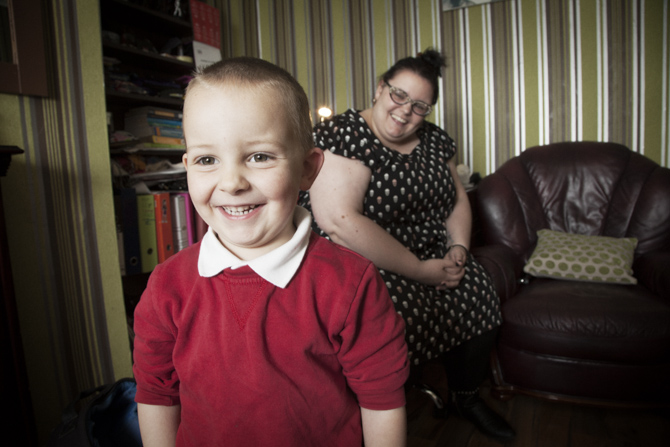
Mum of two, Kellyann was at rock bottom when she first walked into the UCAN more than three years ago. In our first interview she talked about how the staff had helped her turn her life around. She was thrilled to have been accepted onto a mental health nursing degree course at Salford University.
The course is a combination of university study and placements in local (and not-so-local) hospitals and already she’s doing well. She’s just heard she’s gained firsts in her end-of-year exams.
Apart from the kitchen there is just this one room downstairs. There’s a desk at one end and a TV at the other. “How do you manage to study with everything going on around you?”
“A pair of headphones, a bit of Josh Groban, a mug of tea and I’m fine,” she says. “You just get on with it. You’ve got to.”
“And you’re still having to work as a hospital cleaner to make ends meet?”
“I’m still working, but not killing myself, like I was. Now it’s more for the niceties, the little extras.”
Wallpaper has gone up since I was here last. “I can’t take any credit. Paul decorated it all,” she says. “I chose it, paid for it and he put it up.”
“It looks great. He’s done a good job. And how are the kids doing?” I ask. Seven-year-old Romanyalice is at school and three-year-old Jackson, who still only does short days at nursery, is taking a nap upstairs.
“Really well,” says a proud mum. “They punished me when I was last on placement – we were like ships passing in the nights – they didn’t like that. But they know why I’m doing it and they’re cracking now.”
“How much longer do you have?”
“Two years and four months,” she says, straight off.
“Sounds like you’re crossing off the weeks,” I suggest. She nods. “And what would you like to do once you’re qualified?”
It’s no surprise to me that Kellyann has it all planned out. She’s ambitious and determined, and it’s not just for her, it’s for her whole family. “After my degree I want to work locally and do a Masters and then, before I’m 40 – I’m 29 now – I’d like us all to move to Canada. It’s a better way of life there, isn’t it?”
And it all started with her dropping into the UCAN to sit and knit with a group of her neighbours. There’s no doubt it continues to be a long haul for Kellyann but I can see she is happy despite the struggles. She’s on her way. We finish our interview and, as Jackson is still asleep, I say I’ll pop back later to take some snaps.
Jackson is inquisitive about what’s in the big black bag. He ‘helps’ me set up my equipment and, after I’ve put the strap around his neck and explained what to press, he takes a couple of shots of his mum and dad.
“I can see you’d make a great photographer when you’re older.” I say, taking the camera back from him. “Now then. Do you want a picture with your mum, or do you want to stand on your own?”
Jackson stands confidently in the middle of the room and looks into my lens.
“Tell me some of your success stories,” I ask.
“There was one resident who was so nervous about meeting new people, that the thought itself would trigger a panic attack. She was looking for work but would only apply for jobs where she thought she could avoid people, like cleaning an empty office. She was struggling to apply for enough jobs that suited her and looked as if she might get sanctioned by the Jobcentre.”
“And you were able to help?”
“I worked with her for a number of weeks and by challenging some of the triggers we were able to get her anxiety under control. It had a big impact and has opened a lot of doors for her. She told me recently that she was now applying for customer service jobs.”
“That’s brilliant. And that’s just with weekly half-hour sessions?”
“I tend to see people fortnightly, typically for about six sessions,” she says.

Jade is a psychological wellbeing practitioner in the Think Positive service paid for by the Council and part of a community public health team. She’s at the UCAN every Wednesday morning.
“We help people who suffer from the very common issues that can affect us all from time to time: stress, anxiety, low mood, panic attacks. We can all get a bit stuck sometimes, and it’s about building positive coping strategies and letting people be hopeful about the future again.”
“Do people living in low income areas like Breightmet suffer from these issues more?” I ask.
“We know that people living in deprived areas are more likely to experience these problems, although anyone can experience them at some point in their life, whatever their situation. I see people with a lot of pressure on them: from the Jobcentre, from family or neighbours. It’s a very close-knit community, which has many positives, but that brings pressures too.
“I see a lot of people here at the UCAN suffering from panic attacks,” says Jade. “It’s unbelievably common and yet, if you’re a sufferer, you don’t realise how common it is. It’s not something people chat about.”
Oh, the stigma of mental health. It’s been some time now but I can still remember the relief when you realise you’re not the first person to feel that way. “It’s about knowledge isn’t it?” I say, “knowing you are not the only one, understanding a little of what’s going on in your mind.”
“Just having the right information can make a big difference,” says Jade. “I see people who have had a lot of knock backs and are struggling with the get-up and go. My role is to give people ways to problem solve, to build their motivation and find out what interests them.”
“And the welfare reforms,” I ask, “have they had an impact?”
“It’s another thing to deal with, isn’t it?” says Jade. “Additional pressures like the Bedroom Tax are making existing problems more difficult. But, on a positive note, by being here at the UCAN I can help people better by telling them about the other services – Money Matters, the CAB, the credit union – who can help with the housing and financial issues.”
“So you signpost clients on?”
“Yes, and it’s very easy to do here at the UCAN because there’s a holistic approach here where we can offer solutions on the doorstep, in a place people are already comfortable with.”
Jade and I were meant to meet up in a couple of weeks but one of her clients is a ‘no-show’ this morning and so I’ve nipped in. I ask her whether she gets a lot of that.
“It’s not that bad,” she says, “obviously it’s not great if people don’t turn up, especially if there are other people waiting to see me, but there are many reasons why people might miss an appointment and a lot of services will drop you if you don’t turn up. We felt it was really important that we didn’t do that.”
“It’s almost a sign that your service is needed more,” I suggest.
“Exactly. People might be struggling that morning because of anxiety, they might not be able to leave the house. But we don’t give up on them. We try and call them, send a follow-up letter and invite them to get back in touch.”
Her next appointment has arrived downstairs and so I take a quick snap and leave her to it.
He checks the fuel, sets the starter and gives a yank on the cable. The strimmer roars as he clips the machine onto his harness. He’s off sweeping from side to side, taking the heads off dandelions and sending grass cuttings into the air.
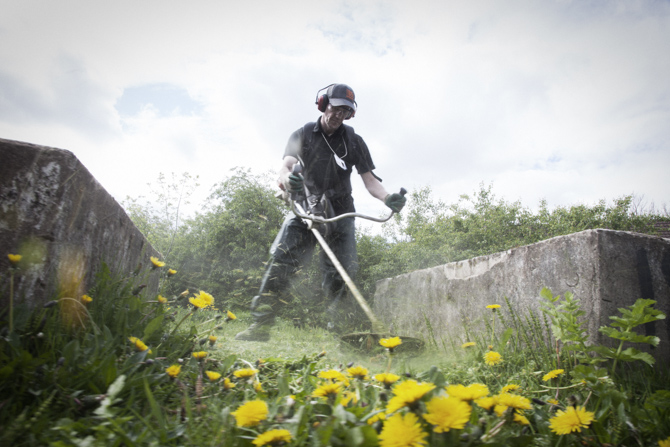
“Slow down a bit Sean,” shouts Paul above the noise. “Slow down or you’ll tire yourself out before long.”
The last time I saw Sean he was sat in front a computer with Rosanne. He’s been getting some intensive support from the UCAN these last two months.
“I’m just coming out of a depression,” he tells me after Paul has suggested he give the machine a break. “But all this has brought me out of my shell.”
As part of the new welfare reform regime Sean has been moved onto Jobseekers’ Allowance from Incapacity Benefit. It hasn’t been easy for him. Down at the UCAN he’s signed up for IT training and regularly attends the job club. He’s also been one of Mike’s mentees.
“Yes, I’ve been having one-to-one with Michael. He’s all right, Michael. He got me my specs.”
Another quick win. The UCAN staff realised that Sean was having difficulty with his reading and quickly diagnosed eyesight issues. It was Mike who got him in front of the optician.
“I used the bottom of a glass to read,” recalls Sean with a laugh. “Now it’s a lot less bother. I can just pick up a paper and read it straight away.”
We’re round the corner from the UCAN at the Red Lane allotments. Paul works for the Mojo Trust (still known by many as their previous incarnation, Bolton Wise), an organisation that trains unemployed people in all things horticultural.
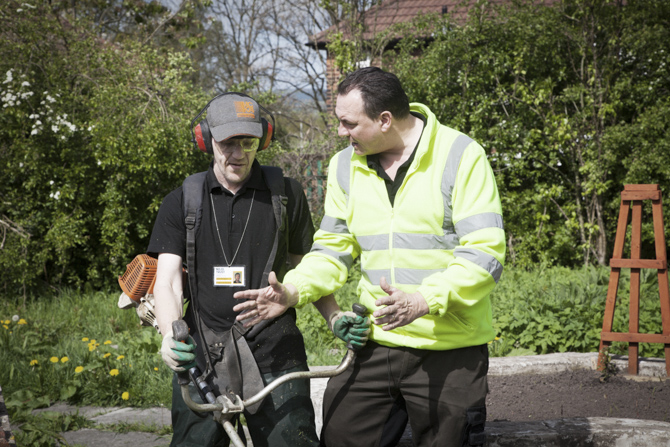
“We take trainees through an NVQ in Amenity Horticulture and Hard Landscaping,” he says. “They’ll usually do two days a week for 12 weeks and come out with a qualification and some experience.
“And yes, it is about qualifications but it’s also about keeping people busy and learning social skills. If you’ve been out of work for a while you tend to forget how to talk to people, and just getting out of the house, doing something different, can be very motivational.”
This ‘Estate Rangers’ project is part of the UCAN’s big push to help specific clients who have been long-term unemployed, which I have been writing about over the last few blog posts. Like all things UCAN, it’s joined-up and tailored to the individual.
There should be more at this morning’s session but other participants have appointments to attend. Steven is tending one of the raised beds. “This is actually my own bed,” he says, “I come down at other times but I’m just learning all this green stuff. I’ve got potatoes, broad beans, onions…”
“… and this is mint here,” I say, plucking and smelling a leaf, “nice boiled with new potatoes.”
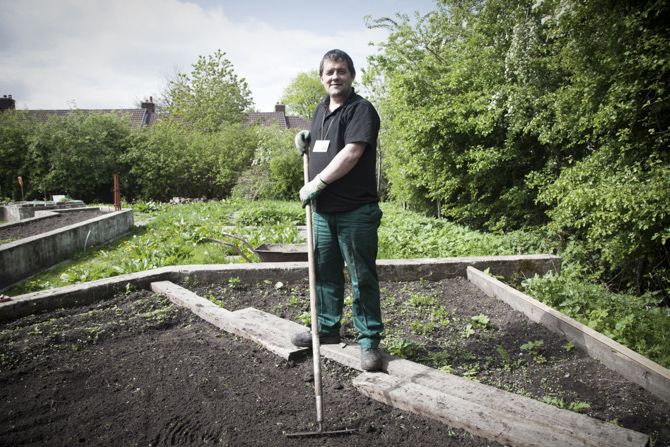
Ten years ago Steven was an industrial window cleaner but hasn’t worked since. He and his ex-partner have both had issues over substance mis-use and their two children no longer live with either of them.
“I’ve changed my life around in the last seven or eight months,” he says, “and the authorities just need to see me keep it going. All I want is my children back home.”
“And all this helps?” I ask waving my arm around the allotment.
“Yeah, it does help. Otherwise I’d be stuck in, being bored and possibly tempted again. I don’t want that. Things are looking up but it’s been hard, very hard.”
I leave them to it as Steven takes his turn with the strimmer.








